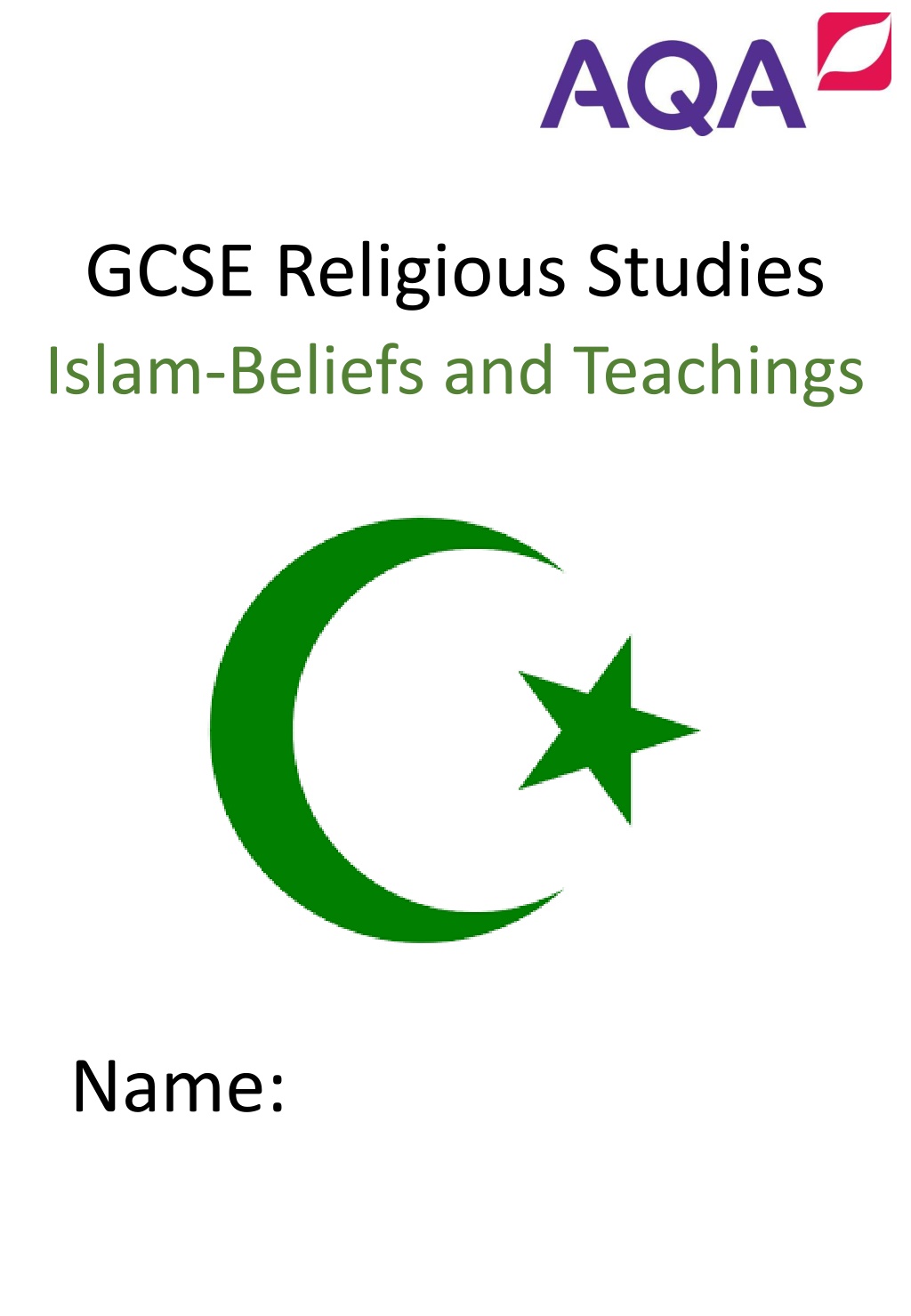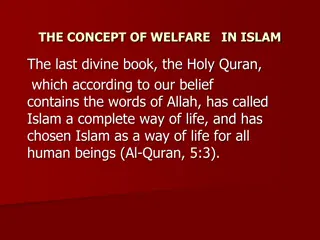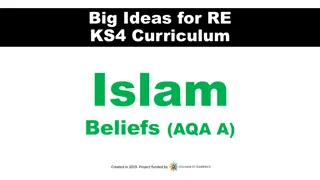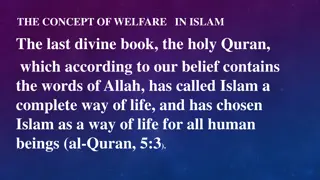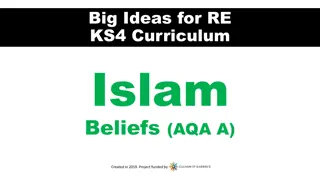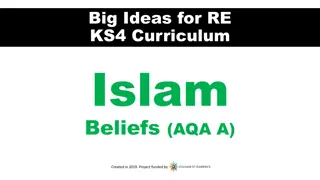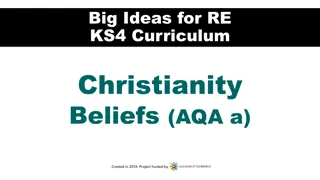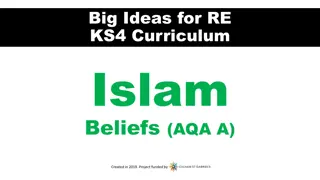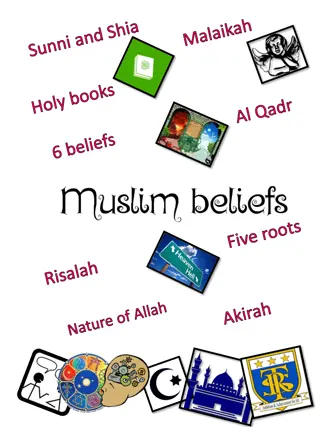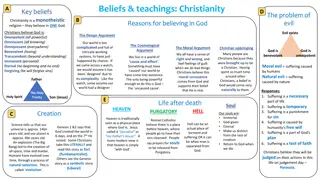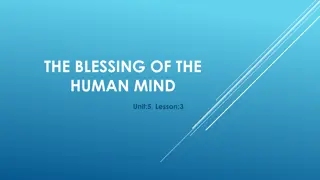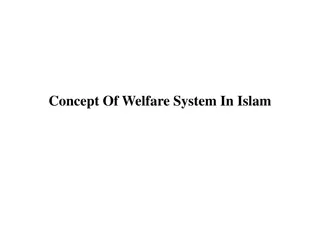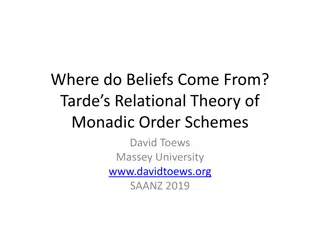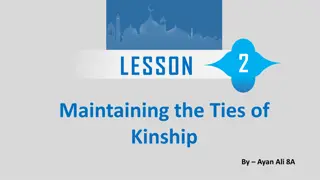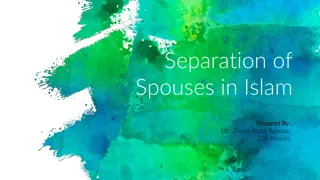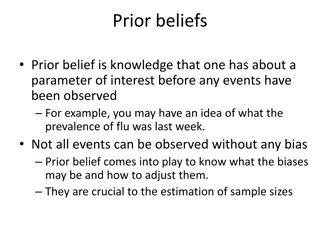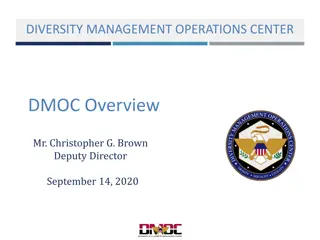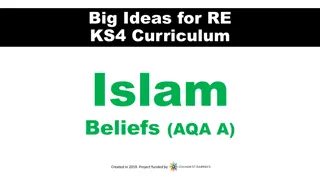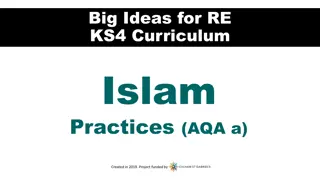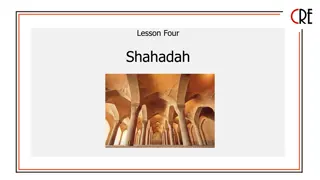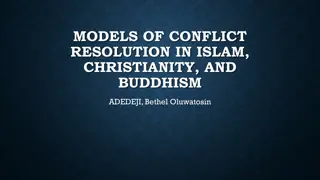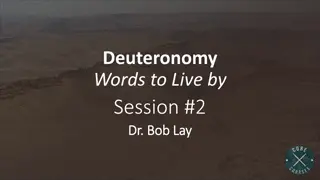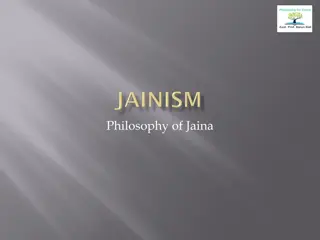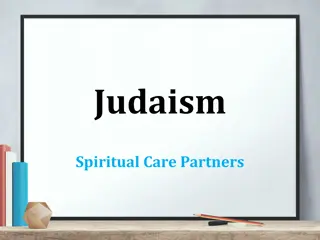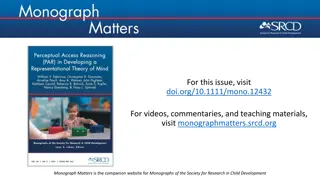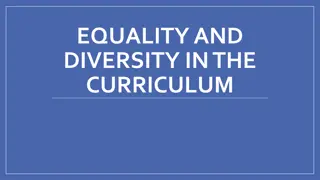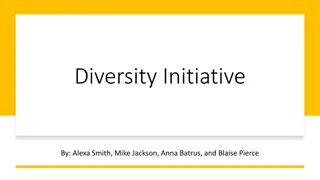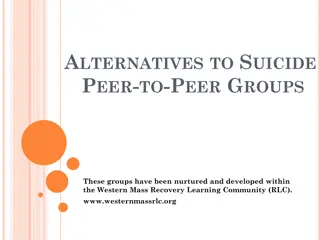Understanding Islam: Beliefs, Teachings, and Diversity
Explore the foundational beliefs and teachings of Islam, including the key features of the religion and its historical origins. Discover how Islam is practiced by different denominations like Sunni and Shi'a, and test your knowledge with engaging activities and tasks related to Islamic faith.
Download Presentation

Please find below an Image/Link to download the presentation.
The content on the website is provided AS IS for your information and personal use only. It may not be sold, licensed, or shared on other websites without obtaining consent from the author. Download presentation by click this link. If you encounter any issues during the download, it is possible that the publisher has removed the file from their server.
E N D
Presentation Transcript
GCSE Religious Studies Islam-Beliefs and Teachings Name:
Islam Beliefs and Teachings- Work Booklet Link to the Textbook on Frog: https://drive.google.com/file/d/1vPfsclh_ZzjwGAEXzJnrKwMJEukl31Yw/view
Additional Lesson- An introduction to Islam Know how Islam began. Describe some of the key features of Islam. Understand not all Muslims believe the same thing. Task A: Watch the video and fill in the timeline https://www.youtube.com/watch?v=PDxKxnVZtgo 570CE 595CE 610CE 611-619CE 620CE 622CE 621- 632CE 633-635CE 1
Additional Lesson- An introduction to Islam Know how Islam began. Describe some of the key features of Islam. Understand not all Muslims believe the same thing. Task B: Key Word Match- Research to help you/ Use the textbook 1. Islam A. A community of Muslims; all belong to a worldwide community; equal in the eyes of God. 2. Muslim B. The Arabic name for God. 3. Allah C. The person who submits themselves to the will of Allah. 4. PBUH (peace be upon him) D. Sign of respect for a prophet. 5. Ummah E. Surrender; obedience; submission or peace. Key Facts/ Features of Islam Muslims believe Islam was gradually revealed to humanity through various prophets over many centuries. It was first revealed to Adam, the first man. The final and most complete revelation was made to Muhammad in the seventh century. Islam also means peace as it is thought that if we obey God s will the person will achieve peace in themselves. Islam is the second largest religion in the UK. 2.6 million people in the UK are Muslims. It is the second largest religion in the world. Muslims believe in the Ummah, the single worldwide community of Muslims. This means that they are all equal in the eyes of Allah. The 5 points on the star represents the 5 pillars of Islam. (5 main rules/ duties) Green is the colour of life; in paradise people will wear green robes. Each new month in Islam starts with the sighting of the moon; It reminds Muslims that Allah created everything The Five Pillars of Islam Sunni and Shi a Muslims have 5 rules to help them maintain the community and their faith. They are the 5 pillars of Islam. They show their devotion to Allah by following these pillars in their daily lives. 2
Additional Lesson- An introduction to Islam Know how Islam began. Describe some of the key features of Islam. Understand not all Muslims believe the same thing. Denominations of Islam: Most religions have different believers that all consider themselves to be part of that religion. (Like Christianity; Catholic, Protestant etc) They have similarities and differences between the faith. The two main branches in Islam is Shi a and Sunni. Sunni Muslims make up around 80% of the total of the Islamic faith. Sunni is prominent in countries such as Egypt, Afghanistan and Morocco. Around 20% of Muslims are Shi'a, in countries such as Iran and Iraq. Task C: True or False? 1. 2. 3. 4. 5. 6. 7. 8. Muhammad was born before Jesus. The star in the symbol must have 5 points. Islam is the third largest religion in the world. Salat means prayer. Sunni Muslims make up 20% of the population of Islam. Ummah is the single worldwide community. Muhammad had the Qur an revealed to him in the Kaaba. Sunni and Shi a follow a different amount of pillars. GCSE 2 Marker Practice Question: Name two of the Five Pillars of Islam 1)_________________________________________________________________ 2) ________________________________________________________________ 3
Additional Lesson- An introduction to Islam P8-9 of Islam Textbook Understand Muslim beliefs in the Oneness of God and the Supremacy of God s will. Task A: Key Word Match- Research to help you/ Use the textbook 1. Tawhid A. The oneness and unity of God. 2. Monotheistic B. A religion that only believes in one God. 3. Supremacy C. Supreme power or authority; a quality of God Task B: Using the quote- List the 7 main beliefs of Muslims. I believe in Allah, in his angels, in his books, in his messengers, in the Last Day and in the fact that everything good or bad is decided by Allah, the Almighty, and in life after death. Articles of Faith The Oneness of God/ Tawhid: Tawhid id the belief that there is only one God. This belief is repeated daily in the Shahadah- a statement of belief. This then makes Islam a monotheistic religion. Muslims believe that God is an undivided entity- not made up of anything else (like the trinity). Nothing else has the attributes (characteristics) or qualities of God. Muslims believe that the only sin that God cannot forgive is attributing God like qualities to any other being or thing- this is the sin of Shirk Task C: Explain how the quotes link to the Oneness of God There is no God but Allan and Muhammad is his prophet. The Shahadah Say, He is One, God the eternal. He begot no one nor was He begotten. No one is comparable to Him Qur an 112:1-4 4
1.1 The Oneness of God and the supremacy of Gods will P8-9 of Islam Textbook Understand Muslim beliefs in the Oneness of God and the Supremacy of God s will. Why is it unforgivable to compare God? Muslims believe that you cannot draw or have any images of Allah ( or the prophets) as you can not compare him to anything we (humans) can possibly imagine. This would be committing the sin of Shirk. This is why Allah was given 99 names- to explain his character rather than how he looks (which is not important) God is unique, there is nothing like God. That is why Mosques are beautifully decorated with patterns, calligraphy or Qur anic verses. Muslims do not worship the prophets as you should only worship Allah. Task D: Complete the questions and explain the quotes using p9 of the textbook The Supremacy of God s will What is God to Muslims? Why would Muslims accept whatever happens to them? What do Muslims do to show they accept God s will? How do these beliefs link to free will? You who believe, obey God and the messenger. Qur an 4:59 The impact these beliefs have on Muslims What must Muslims do to show they believe in God? What do Muslims believe about everything that happens in their life? Misfortunes can only happen with God s permission. Qur an 64:11 5
1.1 The Oneness of God and the supremacy of Gods will P8-9 of Islam Textbook Understand Muslim beliefs in the Oneness of God and the Supremacy of God s will. Task E: Mind map How would knowing God is in control of what happens in your life make a believer feel? GCSE 2 Marker Practice Question: Give two examples of how a Muslim would commit the sin of shirk. 1)_________________________________________________________________ 2) ________________________________________________________________ GCSE 4 Marker Explain two ways in which a belief in the supremacy of God s will influences Muslims today. __________________________________________________________________ __________________________________________________________________ __________________________________________________________________ __________________________________________________________________ __________________________________________________________________ __________________________________________________________________ __________________________________________________________________ __________________________________________________________________ 6
1.2 Key belief in Sunni and Shia Islam P10-11 of Islam Textbook Know the origins of Sunni and Shi a Islam. Know the key beliefs of Sunni and Shi a Islam. Know the similarities and differences between Sunni and Shi a Muslims Task A: Key Word Match- Research to help you/ Use the textbook A. The teachings and deeds of Muhammad. 1. Qur an B. Muslims who believe in the Imamate, the successorship of Ali. 2. Sunnah C. The Holy book revealed to Muhammad by the Angel Jibril. God s final revelation to mankind. 3. Sunni 4. Shi a (Shi l) D. Muslims who believe in the successorship of Muhammad of Abu Bakr, Umar, Uthman and Ali. Sunni Muslims: When Muhammad died, the majority of Muslims thought that only the Qur an and the Sunnah (Muhammad s teachings and actions) had the authority to guide the beliefs and behaviour of Muslims. They elected Abu Bakr to be their leader and to act on behalf of God and Muhammad. They became known as Sunni s because they followed the Sunnah. Shi a Islam: This group of Muslims believe that when Muhammed died, he named his cousin Ali, as his successor. Ali was one of the earliest converts to Islam and was also married to Muhammad s daughter, Fatima. Shi a Muslims believe that the true leader of Islam had to be a descendent of Muhammad and chosen by God. These were known as the Imams. When one died, they would elect the next to succeed them. Why did they split? These two groups split because they both believed someone different succeed Muhammad. Although they have similar beliefs such as belief in Allah, the prophets and guidance of the Qur an. They differ with interpretations of certain aspects of belief and law, and in the emphasis, they put on expressing key beliefs. Key Characters in Islam: Abu Bakr- Muhammad s father in law and best friend (Sunni) Umar- Advisor to Muhammad (Sunni) Ali- Muhammad s cousin and Son in law (Both Sunni and Shi a) Uthman- Friend (Sunni) Task B: Watch the video and bullet point the similarities and differences between Sunni and Shi a Muslims https://www.youtube.com/watch?v=Kt3yFGiElrs 7
1.2 Key belief in Sunni and Shia Islam P10-11 of Islam Textbook Know the origins of Sunni and Shi a Islam. Know the key beliefs of Sunni and Shi a Islam. Know the similarities and differences between Sunni and Shi a Muslims Similarities Differences Task C: Using P10-11 and list the Sunni beliefs about the Six articles and Shi a beliefs about the Five Root of Usul ad-Din. (Give detail) Sunni 6 Articles. 1) Shi a Roots 1) 2) 2) 3) 3) 4) 5) 4) 6) 5) 8
1.2 Key belief in Sunni and Shia Islam P10-11 of Islam Textbook Know the origins of Sunni and Shi a Islam. Know the key beliefs of Sunni and Shi a Islam. Know the similarities and differences between Sunni and Shi a Muslims GCSE 2 Marker Practice Question: Name two of the six articles of faith for Sunni 1)_________________________________________________________________ 2) ________________________________________________________________ GCSE 4 Marker Explain two similarities between Shi a and Sunni Muslims __________________________________________________________________ __________________________________________________________________ __________________________________________________________________ __________________________________________________________________ __________________________________________________________________ __________________________________________________________________ __________________________________________________________________ __________________________________________________________________ GCSE 4 Marker Explain two difference between Shi a and Sunni Muslims __________________________________________________________________ __________________________________________________________________ __________________________________________________________________ __________________________________________________________________ __________________________________________________________________ __________________________________________________________________ __________________________________________________________________ __________________________________________________________________ GCSE 2 Marker Practice Question: Name two of the five roots for Shi a Muslims 1)_________________________________________________________________ 2) ________________________________________________________________ 9
1.3 Nature of God P12-13 of Islam Textbook Understand Muslim beliefs about the nature of God. Task A: Key Word Match- Research to help you/ Use the textbook A. The idea that God treats people fairly and impartially without favour and discrimination. 1. Immanent B. The idea that God is present in and involved with life on earth and in the universe; a quality of God. 2. Transcendent C. Benevolent; all-loving, all good. 3. Omnipotent D. The quality of God that shows compassion or forgiveness to humans even though he has the power to punish them. 4. Beneficent 5. Merciful E. The idea that God is just and fair and judges human actions, rewarding the good and punishing the bad. 6. Fairness F. The idea that God is beyond and outside life on earth and the universe. 7. Justice (Adalat) G. Almighty; all powerful. Task D: Complete the questions and explain the quotes using p12-13 of the textbook The Nature of God Why do Muslims say Allahu Akbar ? What does it mean? What do Muslims believe about how God has revealed himself? And why does he have these? What do Muslims do with these 99 names? Where is God to Muslims? Why is it difficult for humans to understand? The Most excellent names belong to God: use them to call on Him. He is with you wherever you are. Qur an 57:4 Qur an 7:180 10
1.3 Nature of God P12-13 of Islam Textbook Understand Muslim beliefs about the nature of God. Explain what Muslims believe God is like. What are his qualities and how does he use them? This is God, your Lord, there is no God but Him, the Creator of all things, so worship Him; He is in charge of everything. No vision can take Him in, but He takes in all vision. He is all Subtle, the All Aware. Qur an 6:102-103 GCSE 4 Marker Explain two qualities of Allah and how they might influencea Muslim s daily life. __________________________________________________________________ __________________________________________________________________ __________________________________________________________________ __________________________________________________________________ __________________________________________________________________ __________________________________________________________________ GCSE 5 Marker Explain two Muslim beliefs about the nature of God Refer to a religious source/ quote in your answer __________________________________________________________________ __________________________________________________________________ __________________________________________________________________ __________________________________________________________________ __________________________________________________________________ __________________________________________________________________ __________________________________________________________________ __________________________________________________________________ __________________________________________________________________ __________________________________________________________________ __________________________________________________________________ __________________________________________________________________ 11
1.4 Angels P14-15 of Islam Textbook Understand Muslim beliefs about Angels. Task A: Key Word Match- Research to help you/ Use the textbook A. The Arabic name for Michael, the archangel of mercy who rewards good deeds and provide nourishment to people. 1. Angels 2. Day of Judgement B. Spiritual beings believed to act as messengers of God. C. A time when the world will end and every soul will be judged by God, and either rewarded or punished. 3. Jibril 4. Mika il D. The Arabic name for Gabriel, the archangel who brought God s message to the prophets, particularly to Muhammad. 5. Malaikah E. The belief in angels What are angels? Muslims believe that Angels bring the word of God to the world via the prophets or the messengers of God. For Sunni Muslims the belief in angels is one of the 6 articles of faith. Angels are part of the unseen world. They are supernatural beings, created by God from light. Task B: Explain what the quote teaches Muslims about angels Praise be to God, creator of the heavens and earth who made angels messengers with two, three, four [pairs of] wings. Qur an 35:1 What do Muslims believe about angels and what angels do? Muslims believe that Angels are able to receive God s words directly form him and pass them on to prophets. They can do this because they are pure and sinless. Angels do not have free will like humans, therefore they cannot disobey him. Unseen beings who do have free choice are called jinn (spirits). The most famous jinn is Iblis, who is also known as Shaytan (Satan). He was not a fallen angel. Angels are involved in human life from the moment of conception to the moment of death. Some are guardian angels that take care of people throughout their lives. Other angels are responsible for recording a book of deeds , everything each person thinks, says or does will be written in the book to be used on judgement day. Muslims believe that Angel Israfil will blow a trumpet to announce the day of judgement. The angel of death (Malak Am-Maut) with his helpers will then take souls to God. Angels guide souls to the gates of heaven or hell. Angels question Muslims in the grave before they are resurrected to ask if they believe and are faithful to God. Muslims believe that Angels can take human form when appearing to people they are giving messages too. For example, angels to Ibrahim (Abraham) and Maryam (Mary) as men. 12
1.4 Angels P14-15 of Islam Textbook Understand Muslim beliefs about Angels. Task C: Explain what the quotes teach Muslims about angels Each person has angels before him and behind, watching over him by God s command . Qur an 13:11 The record of their deed will be laid open and you will see the guilty, dismayed at what they contain, saying Woe is us! What a record this is! It does not leave any deed, small or large unaccounted for! They will find everything they ever did laid in front of them: Your Lords will not be unjust to anyone. Qur an 18:49 Task D: Using p14-15 of the Islam text book make your own notes on Jibril and Mika il. Include: What they do/ have done- include stories. Why they are important Add any quotes to your notes and explain the meaning of them. 1) 2) 3) Jibril Mika il 13
1.4 Angels P14-15 of Islam Textbook Understand Muslim beliefs about Angels. GCSE 2 Marker Practice Question: Give two reasons why Angels Jibril is important to Muslims 1)_________________________________________________________________ 2) ________________________________________________________________ GCSE 4 Marker Explain two ways the belief in angels influences Muslims today __________________________________________________________________ __________________________________________________________________ __________________________________________________________________ __________________________________________________________________ __________________________________________________________________ __________________________________________________________________ __________________________________________________________________ __________________________________________________________________ __________________________________________________________________ __________________________________________________________________ GCSE 5 Marker Explain two beliefs about the roles of Angels Refer to a religious source/ quote in your answer __________________________________________________________________ __________________________________________________________________ __________________________________________________________________ __________________________________________________________________ __________________________________________________________________ __________________________________________________________________ __________________________________________________________________ __________________________________________________________________ __________________________________________________________________ __________________________________________________________________ __________________________________________________________________ __________________________________________________________________ 14
1.5 Predestination P16-17 of Islam Textbook Understand Muslim beliefs about predestination and human freedom. Know how these beliefs relate to the day of judgement. Task A: Key Word Match- Research to help you/ Use the textbook A. Free to choose whether to act in a good or bad way 1. Al-Qadar B. A belief in predestination 2. Predestination C. The belief that everything that will happen had already been decided by God and the date cannot be changed. 3. Free Will What is predestination? There are different ideas about predestination in Islam. Some Sunni Muslims believe that God has already determined everything that will happen in the universe. In God s Book of deeds he has written down everything that will happen. Allah creates all things, including the actions of his creatures, so they must act according to his will. Task B: Explain what the quote teaches Muslims about predestination Only what God has decreed will happen to us. He is our Master; let the believers put their trust in God. Qur an 9:51 What does this link to? This is linked to the Sunni belief in the Supremacy of God s will. Meaning that God s will is so powerful that he can determine everything that is going to happen. This means that Muslim s put greater emphasis on God s omniscience and less emphasis on human freedom, but it does not mean that people have no choice on how they should behave. Task C: Explain what the quote teaches Muslims about predestination Say: Nothing will happen to us except what Allah has decreed for us: He is our protector : and on Allah let the believers put their trust. Surah 9:51 15
1.5 Predestination P16-17 of Islam Textbook Understand Muslim beliefs about predestination and human freedom. Know how these beliefs relate to the day of judgement. So do thing happen because we want them too? (Free Will) or is it because that is what God wants? Imagine you travelled 100 years into the future and watched people- the way they lived, talked and acted- and wrote down notes and observations in a journal. Then you travelled back to today and told everybody how people will live in the future, does it mean people then have no free choice? No! Those people are still deciding for themselves what they want to do- you just happen to see in advance what they are going to decide. For example, I know that if I offered my little boy a bowl of peas or a bowl of Ice cream, he will pick the ice cream. He has been given the choice- but I m just clever enough to know what he is going to choose. Like God does with our actions. Human Freedom/ Free Will People have free will which means they can choose what they want to do. Shi a Muslims believe that God knows everything that is going to happen but allows us to be tested through Free Will. God is the creator of time is not bound by it. Therefore for God there is no past, present or future- for him everything has already happened. Human events happen in time due to cause and effect or human free will, but God is outside of this time. Task D: Write down 1) One important event that has already happened in your life. (With the date) 2) One event that is currently happening in your life. 3) One event you would like to happen in the future with a rough estimate of a date. Now look at this from a far, can you see what is happening? All the events at the same time? This is like God looking down on us. He sees the past, present and future. Muslims do not see any conflict between the supremacy of God s will and human free will as we can act freely and make our own choices. Task E: Explain how the quote links to predestination and free will and what it teaches Muslims God does not change the condition of a people [for the worse] unless they change what is in themselves. Qur an 13:11 16
1.5 Predestination P16-17 of Islam Textbook Understand Muslim beliefs about predestination and human freedom. Know how these beliefs relate to the day of judgement. The link to the Day of Judgement: Muslims believe that on the day of judgement, God will judge humans according to everything they have done throughout their lives. God has given humans free will in order for them to take responsibility for their actions. This means they will be rewarded or punished based on the choices they have made. The main purpose is that God knows everything by allows us to choose what we want to do. Task F: Explain how the quote links to predestination and the Day of Judgement Those who believe, do good deed, keep up the prayer, and pay the prescribed alms, you will then have reward with the Lord. Qur an 2:277 GCSE 2 Marker Practice Question: Give two reasons why God has given us Free will. 1)_________________________________________________________________ 2) ________________________________________________________________ GCSE 5 Marker Explain two Muslim beliefs about predestination Refer to a religious source/ quote in your answer __________________________________________________________________ __________________________________________________________________ __________________________________________________________________ __________________________________________________________________ __________________________________________________________________ __________________________________________________________________ __________________________________________________________________ __________________________________________________________________ __________________________________________________________________ __________________________________________________________________ __________________________________________________________________ __________________________________________________________________ 17
1.6 Life after death P18-19 of Islam Textbook Consider Muslim beliefs about life after death. Understand the importance of human responsibility and accountability for Muslims. Task A: Key Word Match- Research to help you/ Use the textbook 1. Akhirah A. Rising from the dead or returning to life. 2. Resurrection B. A state of total separation from God/ Allah. 3. Heaven/ Jannah C. Everlasting life after death. D. The state of eternal happiness in the presence of God; also called paradise. 4. Hell/ Jahannah Task B: Complete the word gap to show what Muslims believe about life after death Muslims do not believe that death is the end but the beginning of a new stage of life called _______. Many Muslims believe that after death the person still has a conscious _________ in the _______. Here they will enter a state of ________ called Barzakh, which means barrier; no one can cross the barrier to amend things they have done ________ or warn the living. They are waiting for the _________________. Muslims believe they lie in the ______. God will then send two ______ to question them about their faith. If people answer _______ they will see the rewards to come, but if they _______ God, they will see the _________ start right away. Others think that people sleep in their graves until the end of the ________, when the day of judgement will come. Day of Judgement , existence, punishments, world, Akhirah, grave, wrong, grave, correctly, waiting, deny, angels. Task C: Using the above information and p18-19; create a diagram/ flow chart about Muslim beliefs about life after death (what happens when they die) 18
1.6 Life after death P18-19 of Islam Textbook Consider Muslim beliefs about life after death. Understand the importance of human responsibility and accountability for Muslims. Task D: Use p18-19 and add key information on what Muslims believe about the following states Heaven Hell The Day of Judgement Resurrection Task E: Explain what the quote is describing and how it is being described. Garments of fire will be tailored for those who disbelieve; scalding waters will be poured over their heads, melting their insides as well as their skins; there will be iron crooks to restrain them; whenever, in their anguish they try to escape, they will be pushed back in and told, taste the suffering of the fire. Qur an 22:19-22 They will dwell amid scorching wind and scalding water in the shadow of black smoke, neither cool nor refreshing. Qur an 56: 42-44 19
1.6 Life after death P18-19 of Islam Textbook Consider Muslim beliefs about life after death. Understand the importance of human responsibility and accountability for Muslims. On couches of well-woven cloth they will sit facing each other; everlasting youths will go round among them with glasses, flagons and cups of pure drink that causes no headache or intoxication; [there will be] any fruit they choose; the meat of any bird they like ;the beautiful-eyed maidens like hidden pearl; a reward for what they used to do. Qur an 56: 15-24 Task F: Mind map Explain how belief about life after death affect the life of a Muslim. GCSE 4 Marker Explain two ways in which belief about life after death influence Muslims today. __________________________________________________________________ __________________________________________________________________ __________________________________________________________________ __________________________________________________________________ __________________________________________________________________ __________________________________________________________________ __________________________________________________________________ __________________________________________________________________ __________________________________________________________________ __________________________________________________________________ 20
1.6 Life after death P18-19 of Islam Textbook Consider Muslim beliefs about life after death. Understand the importance of human responsibility and accountability for Muslims. GCSE 5 Marker Explain two Muslim beliefs about life after death. Refer to a religious source/ quote in your answer __________________________________________________________________ __________________________________________________________________ __________________________________________________________________ __________________________________________________________________ __________________________________________________________________ __________________________________________________________________ __________________________________________________________________ __________________________________________________________________ __________________________________________________________________ __________________________________________________________________ __________________________________________________________________ __________________________________________________________________ Task: GCSE 12 Marker Plan If there is no life after death, there is no point in living a good life. Evaluate this statement Agree- There is no point living a good life Disagree- There is a point in living a good life 21
GCSE 12 Marker- If there is no life after death, there is no point in living a good life. __________________________________________________________________ __________________________________________________________________ __________________________________________________________________ __________________________________________________________________ __________________________________________________________________ __________________________________________________________________ __________________________________________________________________ __________________________________________________________________ __________________________________________________________________ __________________________________________________________________ __________________________________________________________________ __________________________________________________________________ __________________________________________________________________ __________________________________________________________________ __________________________________________________________________ __________________________________________________________________ __________________________________________________________________ __________________________________________________________________ __________________________________________________________________ __________________________________________________________________ __________________________________________________________________ __________________________________________________________________ __________________________________________________________________ __________________________________________________________________ __________________________________________________________________ __________________________________________________________________ __________________________________________________________________ __________________________________________________________________ __________________________________________________________________ __________________________________________________________________ __________________________________________________________________ __________________________________________________________________ __________________________________________________________________ __________________________________________________________________ 22
____________________________________________________________________________________________________________________________________ __________________________________________________________________ __________________________________________________________________ __________________________________________________________________ __________________________________________________________________ __________________________________________________________________ __________________________________________________________________ __________________________________________________________________ __________________________________________________________________ __________________________________________________________________ __________________________________________________________________ __________________________________________________________________ __________________________________________________________________ __________________________________________________________________ __________________________________________________________________ __________________________________________________________________ __________________________________________________________________ __________________________________________________________________ __________________________________________________________________ __________________________________________________________________ __________________________________________________________________ __________________________________________________________________ __________________________________________________________________ __________________________________________________________________ __________________________________________________________________ __________________________________________________________________ __________________________________________________________________ __________________________________________________________________ __________________________________________________________________ __________________________________________________________________ __________________________________________________________________ __________________________________________________________________ __________________________________________________________________ __________________________________________________________________ 23
1.7 Prophethood and Adam P20-21 of Islam Textbook Understand the concept of prophethood (Risalah). Understand the role and importance of Adam as a prophet. Task A: Key Word Match- Research to help you/ Use the textbook A. A spiritual being created from fire, who was thrown out of paradise for refusing to bow to Adam. 1. Prophet B. The belief that prophets are an important channel of communication between God and humans. 2. Risalah 3. Prophethood C. A person who proclaims the message of God. 4. Iblis D. When God makes someone a prophet to communicate his message to people Task B: What does the quote teach Muslims about prophethood Every community is send a messenger and when their messenger comes, they will be judged justly; they will not be wronged. Qur an 10:47 Prophets: Muslims believe that God has chosen many prophets to bring the meeting of Islam to people. The belief in the prophets and their importance is called Risalah. Prophets are important role models for Muslims as they were good people who live according to God s will. Prophethood is when someone is made a prophet, it is a gift given from God to help humankind understand his message. Prophets help provide communication between humankind and God. Prophets teach people how God wants them to live. God sends prophets when humans have forgot, misunderstood or changed God s message. He sends prophets to put people back onto the right path. Many Muslims believe that there have been over 124,000 prophets in Islam. However 25 are names in the Qur an. The most importance prophets are called messengers or apostles. They have been sent by God to every nation on earth. Task C: Create a story board on the Prophet Adam. Give detail! Use p20-21. Don t worry about the bigger quotes- you will get them later! Remember you do not have to draw Adam (Sin of Shirk!) 24
1.7 Prophethood and Adam P20-21 of Islam Textbook Understand the concept of prophethood (Risalah). Understand the role and importance of Adam as a prophet. 1. 2. 3. 4. 5. 6. 25
1.7 Prophethood and Adam P20-21 of Islam Textbook Understand the concept of prophethood (Risalah). Understand the role and importance of Adam as a prophet. Task D: Explain what the quotes teach about Prophet Adam and how it links to his story One of His signs is that He created you from dust and lo and behold! You became human and scattered far and wide. Qur an 30:20 He first created man from clay then He moulded him. He breathed from His Spirit into him: He have you hearing, sight and mind. Qur an 32:7-9 He taught Adam all the names [of things], then He showed them to the angels and said, Tell me the names of these if you truly [think you can] . They said May you be glorified! What have knowledge only of what You have taught us! You are knowing and wise! . Qur an 2:31-32 Task E: Complete the questions showing your knowledge and understanding 1. What did Adam do for the Angels? 2. What was the one rule Allah gave to Adam? 3. What did Iblis do which made him get thrown out of heaven? 26
1.7 Prophethood and Adam P20-21 of Islam Textbook Understand the concept of prophethood (Risalah). Understand the role and importance of Adam as a prophet. Why is Prophet Adam important? God gave him understand and Adam passed it on to the rest of the human race. He was the first to learn how to plant seeds. He was the first to harvest crops. He was the first to cook food. God taught him the food laws and what humans were allowed to eat. He was the first to repent for wrongdoings. He was taught how to burry the dead. Adam and Eve (Hawwa) had many children including Cain and Abel. Father of the human race. GCSE 4 Marker Explain two ways prophethood influences Muslims today __________________________________________________________________ __________________________________________________________________ __________________________________________________________________ __________________________________________________________________ __________________________________________________________________ __________________________________________________________________ __________________________________________________________________ __________________________________________________________________ __________________________________________________________________ GCSE 5 Marker Explain two Muslim beliefs about Prophet Adam Refer to a religious source/ quote in your answer __________________________________________________________________ __________________________________________________________________ __________________________________________________________________ __________________________________________________________________ __________________________________________________________________ __________________________________________________________________ __________________________________________________________________ __________________________________________________________________ __________________________________________________________________ __________________________________________________________________ __________________________________________________________________ 27
1.8 Ibrahim P22-23 of Islam Textbook Understand the importance of the prophet Ibrahim. Know how Muslims remember Ibrahim through their actions today. Task A: Key Word Match- Research to help you/ Use the textbook A. The annual pilgrimage to Mecca/ Makkah, that every Muslim should try to make at least once in their lifetime. 1. Ka aba B. The black-cube shaped building in the middle of the Grand Mosque in Mecca. The Holiest places in Islam. 2. Id-ul-Adha 3. Hajj C. A Muslim festival that celebrates Prophet Ibrahim and his willingness to sacrifice his son to God. Task B: Watch the video and make notes on the story of prophet Ibrahim https://www.youtube.com/watch?v=F-ZgxRR4VZ4 28
1.8 Ibrahim P22-23 of Islam Textbook Understand the importance of the prophet Ibrahim. Know how Muslims remember Ibrahim through their actions today. Task C: Complete the following questions on Ibrahim and idol worship using p22-23 Ibrahim and Idol Worship What did Ibrahim want to know and do? opportunity)? What did he do (his What did they want to happen to Ibrahim? - - - - - - - What was the miracle that occurred? What was he determined to stop? - - - - What was the result of this miracle? - - Ibrahim and the Ka aba The Ka aba is a small building in the centre of the Masjid al-Haram Mosque in Mecca. (Makkah) It is considered to be the House of God and the holiest place in Islam. Muslims believe that the original Ka aba was built by Adam as a way of asking for forgiveness by Allah. However it was destroyed in the flood of Noah. (Noah s Ark) Ibrahim and his son, Ishmael, rebuilt it on the same site. Ibrahim and Ishmael Many Muslims believe that Ibrahim had a dream in which God asked him to sacrifice his son to him. God did not take the boy, although Ibrahim was willing to sacrifice him, showing that his willingness to be obedient was accepted by God and that he was a true man of faith. During the festival of Id-Ul-Adha each year, Muslims slaughter an animal to remember Ibrahim s willingness to sacrifice his son. Ibrahim and Hajj Ibrahim is also remembered when Muslims go on pilgrimage to Hajj. For some Muslims pilgrimage is a way of returning to the perfection of Ibrahim s faith. At Mina (part of the pilgrimage), Muslims often throw stones at the pillars in the same way that Ibrahim threw stones at the devil that tried to tempt him into disobeying God. Pilgrims also run between the two hills of Marwa and Safa and drink from the well of Zamzam as a way of remembering Hagar. (Ibrahim s wife). She searched desperately for water for her son and God rewarded her with the well. Mecca is sometimes known as the city of Ibrahim . Ibrahim rebuilt the Ka aba which is circled during Hajj. 29
1.8 Ibrahim P22-23 of Islam Textbook Understand the importance of the prophet Ibrahim. Know how Muslims remember Ibrahim through their actions today. Why is Ibrahim important? Ibrahim is the Arabic name for Abraham. Muslims believe that Ibrahim s passed all the texts and commands given by God and so was named the father of all nations. Muslim s believe that Prophet Muhammad was a descendent from Ibrahim s son, Ishmael. The Qur an presents Ibrahim as a role model because of his obedience to God, his kindness and compassion and his refusal to worship idols. He is an important religious male figure in Islam, Christianity and Judaism. This is why they are known as Abrahamic faiths. He was a man of faith who denounced the worship of idols, rebuilt the Ka aba and spread the message that there is only one God. Task D: Explain what the quote shows about Ibrahim s importance Who could be better in religion than those who direct themselves wholly to God, do good, and follow the religion of Abraham, who was true in faith? God took Abraham as a friend. Qur an 4:125 GCSE 5 Marker Explain two Muslim beliefs about Prophet Adam Refer to a religious source/ quote in your answer __________________________________________________________________ __________________________________________________________________ __________________________________________________________________ __________________________________________________________________ __________________________________________________________________ __________________________________________________________________ __________________________________________________________________ __________________________________________________________________ __________________________________________________________________ __________________________________________________________________ __________________________________________________________________ __________________________________________________________________ __________________________________________________________________ 30
1.9 Muhammad and the Imamate P24-25 of Islam Textbook Know the events in Muhammad s life. Understand the importance of Muhammad for Muslims. Understand the role and significance of the Imamate in Shi a Islam. Task A: Complete the questions on Prophet Muhammad using p24-25 (Detail!) Prophet Muhammad s life and his preaching Explain what Muhammad s early life was like. How did Muhammad show that he was religious? What happened after Muhammad s revelation? What did he then spend his life doing? What happened in 610 that showed that Muhammad was important? What did he ask the people of Mecca to do? What do Muslims believe happened to him before Hijrah? Wjat happened in Madinah? What did this lead too? What happened to him because of this? What does it mark the beginning of for Muslims? When did Muhammad die? Why is Prophet Muhammad important? He was the last prophet- showing that he completed the faith. God send angels to him- therefore God trusts him to obey and do his work. He preached that there was only 1 God. He was taken on a night journey where he met prophets from the past and he learnt about how God wanted them to live- e.g. How many times a day to pray. He is mentioned in the Shahadah (Declaration of faith) therefore must be important. Role model- many Muslims call their children Muhammad after him. He took care of his wife and children. He established to Ummah and first Muslim community. He is remembered during Hajj. 31
1.9 Muhammad and the Imamate P24-25 of Islam Textbook Know the events in Muhammad s life. Understand the importance of Muhammad for Muslims. Understand the role and significance of the Imamate in Shi a Islam. Task B: Explain how the quote teaches Muslims that Muhammad is important Muhammad is not the father of any one of you men; he is God s messenger and the seal of prophets: God knows everything. Qur an 33:40 Task C: Key Word Match- Research to help you/ Use the textbook A. A person who leads communal prayer or in Shi a Islam, the title given to Ali and his successors. 1. Caliph 2. Imam B. The divine appointment of the Imams. 3. Imamate C. A person considered to be a political and religious successor to the Prophet Muhammad, the leader of the Sunni Muslim community. When Muhammad died it was not clear who should succeed him. Muslims then split into two groups, Sunni and Shi a. Sunni Islam When Muhammad died Sunni s elected Abu Bakr as their first Caliph. The Caliphate was set up under early Islamic democracy and the Caliphate became strong religious, political empires controlling a lot of territory. (One even became known as the Ottoman Empire!) Shi a Islam: Shi a believe that Muhammad names his cousin and son-in law, Ali, as his successor- so Ali became the Shi as first Imam. For Shi as, it was important Ali took control because they believed that the prophet had appointed him by divine instruction, and that leadership should follow the family line. When Al, died his sone because the Imam. Each Imam that followed was the son of the previous Imam (with the exception of Husayn ibn Ali, who was the brother of Hasan ibn Ali) The Twelver branch of Shi a Islam believe that there have been 12 Imams in total. The last Imam is Muhammad al-Mahdi, who they believe has been kept alive by God and hidden somewhere on earth, and will return with Jesus to bring justice and equality (judgement day) 32
1.9 Muhammad and the Imamate P24-25 of Islam Textbook Know the events in Muhammad s life. Understand the importance of Muhammad for Muslims. Understand the role and significance of the Imamate in Shi a Islam. Why is the Imamate important/ what do they do for Muslims? (Shi a) The Imams not only rule justly but are able to maintain and interpret the Qur an and Shariah law without fault. They believe that the receiving of God s law was completed through Muhammad, but that guiding and preserving of the law continues through the Imams. The Imamate is important because people need guidance on how to live correctly. The Twelvers believe that, in each generation, there has always been and Imam who is the appointed authority in all matters of faith and law, and they are a part of the family of Muhamad, They are honourable people who will stand up for their faith and show commitment to God. They are good role models (however they are not as important as the Prophets) GCSE 2 Marker Practice Question: Give two reasons why Muhammad is important to Muslims 1)_________________________________________________________________ 2) ________________________________________________________________ GCSE 5 Marker Explain two Muslim beliefs about the Imamate Refer to a religious source/ quote in your answer __________________________________________________________________ __________________________________________________________________ __________________________________________________________________ __________________________________________________________________ __________________________________________________________________ __________________________________________________________________ __________________________________________________________________ __________________________________________________________________ __________________________________________________________________ __________________________________________________________________ __________________________________________________________________ __________________________________________________________________ __________________________________________________________________ 33
1.9 Muhammad and the Imamate P24-25 of Islam Textbook Know the events in Muhammad s life. Understand the importance of Muhammad for Muslims. Understand the role and significance of the Imamate in Shi a Islam. Task: GCSE 12 Marker Plan Prophet Muhammad is the most important prophet. Evaluate this statement Agree- Prophet Muhammad is the most important prophet Disagree- Prophet Muhammad is not the most important/ other prophets are/ all equal GCSE 12 Marker- Prophet Muhammad is the most important prophet. __________________________________________________________________ __________________________________________________________________ __________________________________________________________________ __________________________________________________________________ __________________________________________________________________ __________________________________________________________________ __________________________________________________________________ __________________________________________________________________ __________________________________________________________________ __________________________________________________________________ __________________________________________________________________ __________________________________________________________________ __________________________________________________________________ __________________________________________________________________ __________________________________________________________________ __________________________________________________________________ __________________________________________________________________ 34
____________________________________________________________________________________________________________________________________ __________________________________________________________________ __________________________________________________________________ __________________________________________________________________ __________________________________________________________________ __________________________________________________________________ __________________________________________________________________ __________________________________________________________________ __________________________________________________________________ __________________________________________________________________ __________________________________________________________________ __________________________________________________________________ __________________________________________________________________ __________________________________________________________________ __________________________________________________________________ __________________________________________________________________ __________________________________________________________________ __________________________________________________________________ __________________________________________________________________ __________________________________________________________________ __________________________________________________________________ __________________________________________________________________ __________________________________________________________________ __________________________________________________________________ __________________________________________________________________ __________________________________________________________________ __________________________________________________________________ __________________________________________________________________ __________________________________________________________________ __________________________________________________________________ __________________________________________________________________ __________________________________________________________________ __________________________________________________________________ __________________________________________________________________ __________________________________________________________________ 35
1.10 The Holy books in Islam P25-27 of Islam Textbook Understand how the Qur an was revealed, and why it has authority in Islam. Know about the Torah, the Psalms, the Gospel and the Scrolls of Abraham. Task A: Key Word Match- Research to help you/ Use the textbook 1. Torah A. A holy book revealed by God to David. 2. Psalms B. A holy book revealed by God to Jesus. 3. Gospel C. A holy book revealed by God to Abraham. 4. Scrolls of Abraham D. The first five books revealed by God to Moses. The Qur an Muslims believe that the Qur an is the word of God which was revealed Muhammad via the angel Jibril over a period of 22 years. It contains the foundation of every believers faith and is the most sacred text in Islam. It is considered to be written in perfect Arabic. The original Qur an is believe to be in heaven, so when Muslims read the Qur an they believe that God s words are directly speaking to them. The name Qur an means the recital as Muhammad recited by heart each revelation that he received and passed it on to his followers. His followers memorised them and scribed/wrote them down. When Muhammad died, Abu Bakr commissioned an official copy to be complied by another one of Muhammad s companions. Soon converts of different nationalities started to read and write the Qur an in different languages, But because of this the Qur an was in danger of being ,misread or miswritten. Task B: Explain what the quotes teach Muslims about the Qur an This is the Scripture in which there is no doubt, containing guidance for those who are mindful of God. Qur an 2:2 This is truly a glorious Qur an [written] on a preserved Tablet. Qur an 85:21-22 36
1.10 The Holy books in Islam P25-27 of Islam Textbook Understand how the Qur an was revealed, and why it has authority in Islam. Know about the Torah, the Psalms, the Gospel and the Scrolls of Abraham. Task C: Mind map Using p26-27 explain what is inside of the Qur an How do Muslims show respect to the Qur an? Muslims perform wudu (a special way of washing themselves) which involves washing their hands, faces, arms and feet three times. Copies of the Qur an are sometimes kept wrapped up with a cloth around it and it is placed on a high shelf. Muslims place the Qur an on the highest place in the room to show that it is above all. When reading, it is placed on a special stand (similar to the one in the image), so that it does not touch the floor as it can be dirty. How does the Qur an effect/influence the lives of Muslims? Muslims will learn Arabic from a young age in order to read and recite the Qur an. Muslims will go to the Madrassah (the Islamic school). Muslims will treat the Qur an with respect at all times. When Muslims are unsure of what to do they will turn to the Qur'an for guidance. During the month of Ramadan (Fasting), Muslims will make a special effort to read the Qur an as they believe it gives them strength to complete their fast and it also remembers the time that Muhammad was visited and the Qur an was revealed to him. Muslims learn to recite special passages of the Qur an during special festivals. Task D: Answer the questions about what other holy books Muslims accept (P26-27) Why do Muslims accept other Holy Books? And what do they believe about them? Beliefs about the Torah (Tawrat) Why do Muslims accept other Holy Books? And what do they believe about them? 37
1.10 The Holy books in Islam P25-27 of Islam Textbook Understand how the Qur an was revealed, and why it has authority in Islam. Know about the Torah, the Psalms, the Gospel and the Scrolls of Abraham. Beliefs about the Gospel (Injil) The Scrolls of Abraham/ Ibrahim We send Jesus, son of Mary, in their footsteps, to confirm the Torah that has been send before him ;We gave him the gospel with guidance, light, and confirmation of the Torah already revealed- a guide and lesson for those who take heed of God Qur an 5:46 GCSE 2 Marker Practice Question: Name two other Holy books that Islam accepts. 1)_________________________________________________________________ 2) ________________________________________________________________ GCSE 5 Marker Explain two Muslim beliefs about the Qur an Refer to a religious source/ quote in your answer __________________________________________________________________ __________________________________________________________________ __________________________________________________________________ __________________________________________________________________ __________________________________________________________________ __________________________________________________________________ __________________________________________________________________ __________________________________________________________________ __________________________________________________________________ __________________________________________________________________ __________________________________________________________________ __________________________________________________________________ __________________________________________________________________ 38
1.10 The Holy books in Islam P25-27 of Islam Textbook Understand how the Qur an was revealed, and why it has authority in Islam. Know about the Torah, the Psalms, the Gospel and the Scrolls of Abraham. GCSE 2 Marker Practice Question: Name two ways Muslims show respect to the Qur an 1)_________________________________________________________________ 2) ________________________________________________________________ GCSE 4 Marker Explain two ways the Qur an influences the lives of Muslims. __________________________________________________________________ __________________________________________________________________ __________________________________________________________________ __________________________________________________________________ __________________________________________________________________ __________________________________________________________________ __________________________________________________________________ __________________________________________________________________ __________________________________________________________________ Task: GCSE 12 Marker Plan Holy Books are no longer needed in today s society. Evaluate this statement Agree- They are no longer needed Disagree- They are needed 39
GCSE 12 Marker- Holy Books are no longer needed in todays society. __________________________________________________________________ __________________________________________________________________ __________________________________________________________________ __________________________________________________________________ __________________________________________________________________ __________________________________________________________________ __________________________________________________________________ __________________________________________________________________ __________________________________________________________________ __________________________________________________________________ __________________________________________________________________ __________________________________________________________________ __________________________________________________________________ __________________________________________________________________ __________________________________________________________________ __________________________________________________________________ __________________________________________________________________ __________________________________________________________________ __________________________________________________________________ __________________________________________________________________ __________________________________________________________________ __________________________________________________________________ __________________________________________________________________ __________________________________________________________________ __________________________________________________________________ __________________________________________________________________ __________________________________________________________________ __________________________________________________________________ __________________________________________________________________ __________________________________________________________________ __________________________________________________________________ __________________________________________________________________ __________________________________________________________________ __________________________________________________________________ 40
____________________________________________________________________________________________________________________________________ __________________________________________________________________ __________________________________________________________________ __________________________________________________________________ __________________________________________________________________ __________________________________________________________________ __________________________________________________________________ __________________________________________________________________ __________________________________________________________________ __________________________________________________________________ __________________________________________________________________ __________________________________________________________________ __________________________________________________________________ __________________________________________________________________ __________________________________________________________________ __________________________________________________________________ __________________________________________________________________ __________________________________________________________________ __________________________________________________________________ __________________________________________________________________ __________________________________________________________________ __________________________________________________________________ __________________________________________________________________ __________________________________________________________________ __________________________________________________________________ __________________________________________________________________ __________________________________________________________________ __________________________________________________________________ __________________________________________________________________ __________________________________________________________________ __________________________________________________________________ __________________________________________________________________ __________________________________________________________________ __________________________________________________________________ 41
